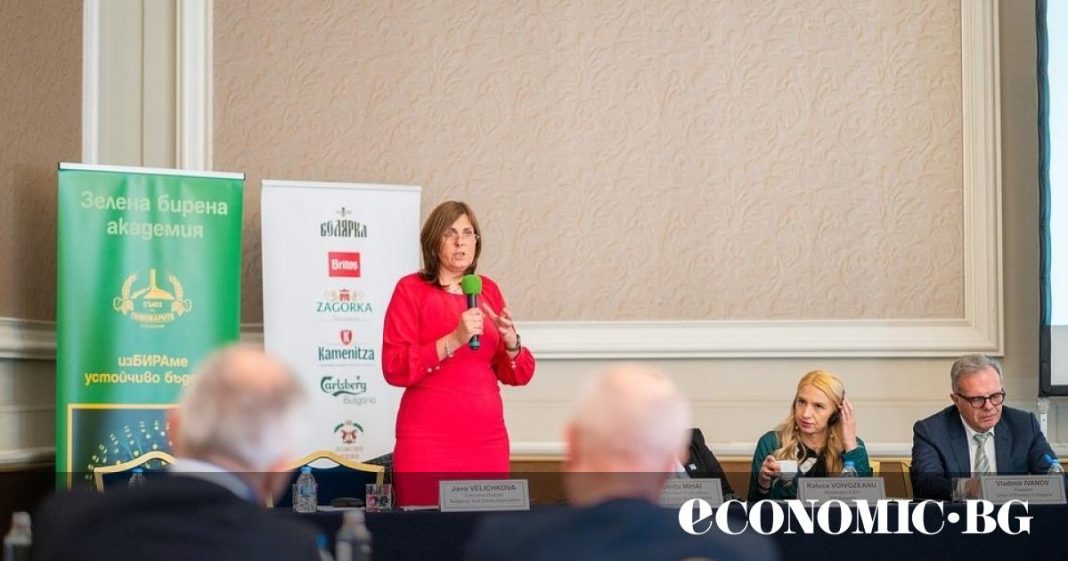Bulgaria is on the verge of introducing a deposit system for beverage packaging – a step considered vital to achieving the country’s ambitious environmental goals. The preparation process has been intensive over the past three years within a working group involving representatives of all stakeholders.
The Ministry of Environment and Water is expected to present the official draft amendment to the Waste Management Act (WMA) soon, which will lay the legal foundations for the future system.
A conference on the topic held in Sofia brought together industry representatives, retailers, environmental organizations, and international guests from Romania to discuss the details and challenges.
The industry’s vision: Who, how, and why
According to Zhana Velichkova, executive director of the Bulgarian Soft Drinks Association, the industry is convinced of the need for a deposit system, as studies show that the target of 90% packaging collection by 2029 is unachievable without it, especially given the national specifics. The industry embraced the idea from the outset and actively participated in the working group to develop legislative proposals and assess the need for studies, Velichkova told Economic.bg.
The design of the system, according to the industry’s vision, is based on the principle of extended producer responsibility, whereby the industry is responsible for packaging at the end of its life cycle and is prepared to bear the financial burden. The system should be managed by a single operator – a non-profit legal entity owned by the main players (manufacturers and retailers) – with the role of the state being to create a strong legal framework and control, rather than holding a stake in the company.
In order to implement this model, it is crucial that the government and parliament ensure a clear and stable regulatory framework. Only in this way can we build a transparent and effective circular economy for beverage packaging,“ Velichkova said.
The investment in infrastructure (excluding reverse vending machines) is expected to be in the range of €40-50 million according to old estimates, with the actual cost becoming clear after the operator is licensed.
Sorting and counting centers will need to be built, strategically located with regard to logistics and environmental benefits. The system will rely on digital coding and traceability of each package from its release on the market to its return, ensuring the refund of the deposit.
Initial studies indicate a deposit level of around 20 cents, which should be high enough to encourage returns but not make products excessively expensive. A uniform deposit amount is proposed regardless of the size and material of the packaging.
The scope, which will be finalized by parliament, will certainly include PET bottles and aluminum cans (a requirement for 2029), with the industry insisting from the outset that returnable glass should also be included.
The final realistic deadline for the system to start is around 2028, as it is impossible to introduce such a complex infrastructure and logistics within a few months. Despite the expected increase in product prices, the industry will seek efficiency to maintain affordability.
The Union of Brewers in Bulgaria, representing 98% of local production, has also declared its full support and readiness to actively participate in the management of the future system with its expertise and financial potential.
Our goal is clear: to implement the best European practices in our country and work together to protect the environment and fulfill our EU commitments on packaging,“ said Vladimir Ivanov, chairman of the Union of Brewers in Bulgaria.
The position of retailers: Flexibility and support are needed
During the conference, Nikolay Vulkanov, Executive Director of the Association for Modern Trade, presented the challenges and needs of the retail sector. According to him, the obligation for retailers to take back packaging is essential for high collection rates, but it burdens stores with non-core activities and requires the use of their existing infrastructure.
Experience from the Romanian system highlights several key points that should be taken into account in Bulgaria: the short implementation period creates difficulties, attempts to cover as many retailers as possible without secure logistics raise problems, and state involvement should be regulatory rather than supervisory. Investments are also a major challenge, especially for smaller retailers.
It is important to build a stable logistics infrastructure for retailers, especially for small businesses. This is the only way to ensure trust and high results. The pace of work needs to be accelerated,“ said Vulkanov.
Given the fragmented structure of retail trade in Bulgaria, it is vital to find the right balance and provide reasonable options for fulfilling obligations. These include: the use of shared return points; voluntary compliance by outlets whose size does not allow for efficient collection; and flexible financing models for collection machines. The latter is particularly important for building trust among smaller local players, Vulkanov commented.
Romania’s experience: Challenges and quick wins
The experience of Romania, which launched its deposit system (the second largest after Germany’s) with preparations starting in November 2022 and full operationality from 2024, offers valuable lessons. Despite the short implementation period and initial difficulties (including the lack of an IT system in the first few months, the need for manual collection at many sites, and logistical challenges), the system achieved rapid success.
The Romanian system is centralized, with 20% state participation in the operator, and covers a population of nearly 20 million and around 7 billion packages per year (PET, aluminum, glass from 0.5 to 3 liters).
Romanian representatives reported that within eight months of launch, they had achieved a collection rate of over 80%. The country has visibly cleaned up, and the system has created 800 jobs. Consumer support is high (over 90%), despite initial queues. The system is financed by a €85 million loan backed by corporate guarantees from producers.
The model is designed to cover costs, with the main revenue coming from the sale of the collected material (clean quality is key), fees from producers, and unclaimed deposits.
What do consumers need to know about the system?
When purchasing a beverage in packaging covered by the system (such as plastic and glass bottles and aluminum cans), a small fixed amount is added to the standard price of the product – this is the deposit.
Initial studies suggest that this will be around 20 cents, although the final amount is still to be determined.
After consumption, the empty packaging retains the value of the deposit paid. Instead of throwing it in the household waste or recycling bin, the consumer keeps it.
The packaging is returned to an authorized return point, which will most often be the retail outlets where the beverages are sold or specially designated locations. Acceptance can be done either through automated machines or manually.
Upon successful return and acceptance of the packaging (if it meets the requirements, e.g., the label is intact and it is not severely deformed), the deposit amount paid is refunded in full to the consumer. Options for a voucher or direct cash refund are currently being discussed.
This mechanism aims to directly encourage citizens to return used packaging. Special trucks transport it to large counting and sorting centers.
There, the packaging is counted (which is important for the entire system and for financial reporting) and sorted by material type – plastic bottles (PET), aluminum cans, glass bottles. The most important advantage is that the packaging collected through the deposit system is extremely clean – it is not contaminated with other waste, as is often the case with traditional separate collection.
Once counted and sorted, the clean materials (usually pressed into bales) are sold to specialized recycling plants. These plants process them so that new bottles and cans can be made from the old ones. This is called “closed-loop recycling” or “bottle-to-bottle.”
In this way, the deposit system ensures that valuable materials are used again and again for the same purpose – beverage packaging. This reduces the need to produce new plastic, aluminum, and glass from raw materials, saves energy and resources, and really helps to protect nature and clean up the environment. The sale of these clean materials is also an important source of income for the system, which helps to cover some of its costs.
Translated with DeepL.
Източник: Economic.bg


